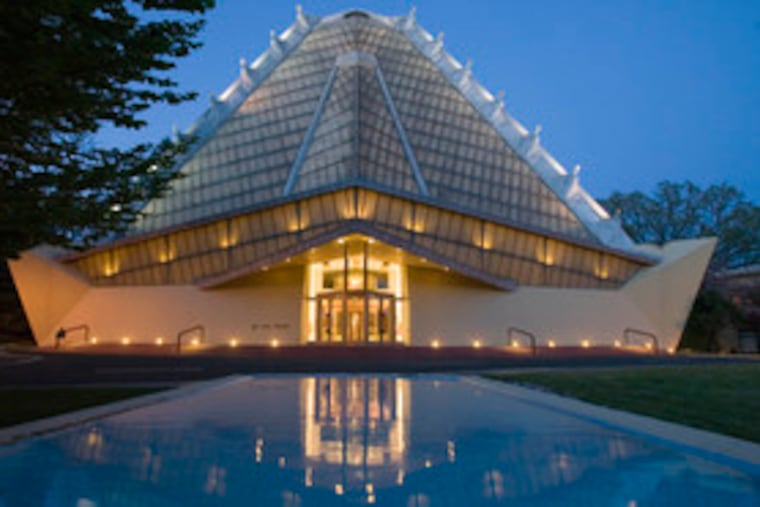Mt. Sinai in the suburbs
Beth Sholom Synagogue in Elkins Park attains historic landmark status.

The old man in Arizona belonged to no religion, but at 86 committed himself to creating "a temple that is truly a religious tribute to the living God."
And if God is anything like Frank Lloyd Wright's soaring masterpiece of concrete and glass in Elkins Park, he is as remote as a mountain and as intimate as a garden. He is luminous and brooding, aloof yet embracing, unpretty but beautiful.
America's premier architect would never know if visitors to his Beth Sholom Synagogue felt they were "resting in the very hands of God," as he hoped they would. Wright died in 1959, six months before the congregation first gathered in his soaring sanctuary on Old York Road.
Yesterday, however, the federal government paid this angular, flat-topped pyramid one of the highest honors it can bestow on a place of American history or architecture: It presented the synagogue with a bronze plaque announcing its new status as a National Historic Landmark and declaring it "one of the greatest achievements of Frank Lloyd Wright."
"This is not just a historic site," William Bolger, regional program manager for the National Park Service, reminded the crowd of about 500 gathered in the sunlit sanctuary. "It is a living monument to our nation's culture."
They clapped and sang the traditional Hebrew song of jubilation: "Siman Tov u Mazel Tov," - a good sign and good luck.
Inspired by the congregation's founding rabbi, Mortimer J. Cohen - whose spiritual vision of a "Mount Sinai of light" helped shaped Wright's design - Beth Sholom is the only synagogue Wright created during his 70-year, 1,000-project career.
The plaque acknowledges Cohen's unique collaboration with the famously dictatorial Wright, and hails their effort to create "a new thing: the American spirit wedded to the ancient spirit of Israel."
Beth Sholom is only the fourth synagogue on the park service's list of about 2,500 national landmarks.
"We felt federal landmark status would go a long way toward people's realizing what a truly important building this is," said Herb Sachs, past president of Beth Sholom Congregation, who launched the effort about two years ago.
Its inclusion on the list, which Secretary of the Interior Dirk Kempthorne signed April 4, also signals a new relationship between Beth Sholom Congregation and its acclaimed building.
Landmark status is part of the congregation's strategic plan to evolve the synagogue into a semipublic site, one whose costly upkeep can be supported in part by tours, government funding, philanthropy and a museum shop.
To that end, the congregation has formed a nonprofit charitable corporation that will shortly become the legal owner of the synagogue. "We don't even have a name for it yet," congregation president Fred H. Wolfson said at yesterday's reception. The new nonprofit became a legal entity on Thursday.
"We're really custodians of a work of art," said Harvey Friedrich, the congregation's executive director.
But custodianship of a 110-foot-tall art object, especially one with with a leaky roof and whopping utility bills, is a mixed blessing for a congregation whose membership has grown older and smaller.
"Young Jewish families are no longer flocking to Elkins Park the way they did in the decades after World War II," Friedrich said. Membership now stands at 950 families, down from a high of 1,300 in the mid-1960s.
Founded by Rabbi Cohen in 1919 in what was then Philadelphia's predominantly Jewish Logan section, Beth Sholom was the first Philadelphia congregation to relocate to the suburbs after the war.
Now, with a newer generation of Jews settling in Bucks County and Blue Bell, "the leadership wanted to ensure that no matter what happened to the demographics in Elkins Park, this wonderful building would be assured its place and would go on," Sachs said.
"We're not prepared to close our doors, by any means," senior Rabbi David Glanzberg-Krainin said. "We're very likely to stay in Elkins Park. But looking down the road 50 years, this is a plan to ensure the integrity of this building."
Putting synagogue ownership into the hands of a secular nonprofit corporation, even though run by congregants, will allow the new entity to seek funding from government agencies and other sources unable, or disinclined, to give to religious institutions, he said.
Plans are under way to create a visitor's center and museum shop, said Sachs, who took a visitor on a quick tour yesterday of an underused lounge and kitchen that are the likely sites of the new spaces.
The congregation has called on Venturi, Scott Brown & Associates, one of Philadelphia's leading architecture firms, to design the visitors' center, and seeks design proposals for a "minimally visible" elevator at the rear of the exterior.
"I have certain opinions about all this," Hedy Elefritz, Cohen's 79-year-old daughter, said in a phone interview from her home in Berwyn. "I'm very delighted it's getting the recognition it deserves," she said. "Unfortunately, that may mean Beth Sholom someday becomes more a museum than a synagogue."
She declined to attend the ceremony, saying she had previous commitments.
But architectural historian Emily T. Cooperman, a consultant to the congregation whose research helped the synagogue win landmark status, hopes the building at last steps out of the shadow of Wright's flamboyantly curvaceous Guggenheim Museum in New York, which also opened in 1959.
Its relative obscurity "in the near-anonymity of Elkins Park" can also be explained in that Beth Sholom "was built for a Jewish congregation and not the rest of the world," she said.
Beth Sholom "far surpasses the Guggenheim as a work of architecture," according to Cooperman, who remembers vividly her first time stepping into the sanctuary.
"It invokes the 18th-century sense of the sublime. You have that experience of awe," she said. "It's one of the most effective religious spaces I've ever seen."
For a slide show on the Beth Sholom Synagogue, visit http://go.philly.com/synagogueEndText